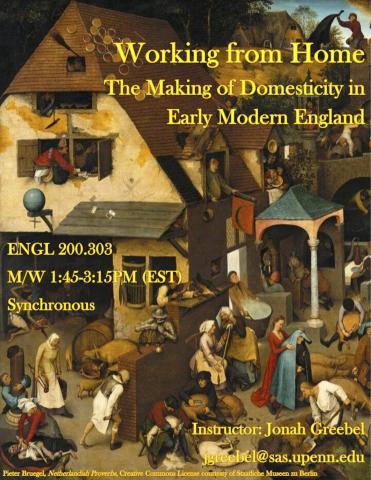Junior Research Seminar: Working from Home: The Making of Domesticity in Early Modern England cancelled
Today, with our ubiquitous use of Zoom, it often feels like the line between public and private is wearing thin. In a strange way, though, this experience might put us more in touch with the inhabitants of early modern England who saw their homes, not as secluded retreats from the world of work, but as sites for conducting business, producing linens and textiles, making cheeses and ales, administering medicine, and educating the young. How, then, did the home come to be seen as a world apart? By turning to literary representations of domesticity from the early modern period, this course aims to unsettle assumptions about the home, revealing these spaces to be more peculiar—and perhaps threatening—than they might at first appear. At the same time as we will be engaged with primary readings about the home that are sure to appear strange to us, we will also be engaging with archival materials and secondary, critical literature in order to further defamiliarize domesticity; as it happens, reading attentively and researching deeply are invaluable skills for uncovering the unfamiliar in the familiar. In order to hone these critical skills, we will ask such questions as these: What does the persecution of witches reveal about anxieties surrounding women’s work? What does it mean that mariticide (spouse-killing) was punished in the period as “petty treason?” And how did the intimate contact between women and servants afford opportunities for resistance to patriarchal and state power? As we attempt to answer these and similar questions, students will become familiar with the research skills and tools necessary in order to pursue research questions of their own.

 Department of English
Department of English
